Executive Summary
Japan’s highly digitized, quality-focused business environment makes accurate B2B data critical for market entry, sales intelligence, and supply chain integrity. This comparison highlights the top providers, focusing on vendors that deliver exceptional local data quality, compliance with the Act on the Protection of Personal Information (APPI), and the scale needed to navigate Japan’s massive B2B e-commerce market, which exceeded ¥465.2 trillion in 2023. We compare providers for comprehensive coverage across key sectors like Manufacturing, Wholesale, Finance, and Healthcare.
Why the Japanese B2B Data Market is Valuable
Companies are heavily invested in this market because Japan has one of the world’s largest B2B e-commerce sectors, representing about 88 percent of the country’s total e-commerce share in 2024. Transaction values reached ¥465.2 trillion, with an online penetration rate near 40 percent. Leading industries such as Transportation Machinery Manufacturing, Electrical Equipment Manufacturing, and Wholesale rely on precise datasets for predictive maintenance, financial risk assessment, and supply chain efficiency.
Connecting with Japanese businesses is valuable for global companies seeking reliable partners, suppliers, and customers in a market defined by rigorous quality standards and rapid digital transformation.
Market & Regional Context
Japan’s data landscape is primarily governed by the Act on the Protection of Personal Information (APPI), which is aligned with global standards such as GDPR, particularly regarding consent and cross-border transfers.
Regulations: APPI has extraterritorial scope, applying to foreign entities that handle the personal information of Japanese residents. It requires explicit consent for collecting and using data, making compliance a critical factor when selecting B2B data providers.
Unique Local Data Sourcing: Local providers often maintain proprietary credit ratings and financial data on SMEs, collected through extensive field networks and in-person research.
Key National Statistics
- Japan’s B2B e-commerce market reached ¥465.2 trillion in 2023, growing 10.7 percent year-over-year.
- B2B accounts for 88 percent of e-commerce activity in Japan as of 2024.
- Internet penetration is about 93.8 percent, supporting a deeply digitized commercial ecosystem.
Evaluation Methodology
Our selection process prioritizes rigor and freshness to provide a neutral, research-based comparison.
Selection Process: Vendors were chosen based on a mix of global scale and verifiable Japan-market presence, focusing on those providing firmographic, credit, and contact datasets. We included three core types: one global bulk leader (InfobelPRO), two essential local Japanese intelligence leaders (Teikoku Databank, Toyo Keizai), and one national credit and SME-focused specialist (Tokyo Shoko Research).
Weighting Factors
- Local coverage and update cadence, particularly for SMEs.
- Compliance with APPI.
- Data quality and verification standards.
- Usability insights from industry sources and vendor documentation.
Comparison Table (Focused on Local Leaders)
|
Provider |
Coverage |
Format |
Update Cadence |
Integrations |
Pricing |
Best for |
Limitations |
Source(s) |
|
InfobelPRO |
Global (375M+ companies, Japan included) |
Bulk Datasets, API |
Real-time API, Regular bulk updates |
CRM/KYB APIs, custom integrations |
Cost-efficient per record (bulk) |
Large-scale enrichment, KYB, data ingestion |
Requires technical integration |
InfobelPRO Vendor Docs |
|
Teikoku Databank (TDB) |
Largest database of Japanese companies (>1.3M) |
Credit Reports (CCR), Snapshot, Database |
Daily updates |
Direct database access, custom integrations |
Report-based or subscription |
Proprietary credit ratings, SME financials |
Focused on credit/risk, limited sales contacts |
TDB Corporate Docs |
|
Toyo Keizai (TK) |
Listed company and financial coverage |
Data lists, estimates, databases |
Regular updates |
Institutional APIs, investor models |
Institutional subscription |
Financial forecasts, ESG analysis |
Specialized for capital markets, less SME depth |
Toyo Keizai Data Services |
|
Tokyo Shoko Research (TSR) |
Millions of listed and unlisted companies |
Credit Reports, Database, API |
Continuous updates via field offices |
Online portal, custom integrations |
Subscription and report fees |
Credit risk, due diligence, SME insights |
Focused on credit/risk, less marketing data |
TSR Corporate Docs |
|
Sansan |
Firmographic and contact data |
SaaS, card scanning, API |
Real-time via user input and verification |
Major CRMs, marketing automation |
SaaS subscription |
Business card digitization, networking |
Coverage limited to contacts exchanged as cards |
SaaS Vendor Docs |
InfobelPRO at Global Scale
InfobelPRO provides one of the world’s largest company datasets, with over 375 million business profiles and extensive coverage of Japanese enterprises. Our approach differs from subscription SaaS platforms because we deliver bulk datasets and APIs designed for integration into enterprise workflows. This makes the cost per record significantly more efficient for organizations managing millions of records or building compliance and verification systems. While this model requires more upfront integration work, it gives teams full control over how data is applied across CRMs, analytics platforms, and regulatory processes.
Vendor Deep Dive (Top 5)
- InfobelPRO
InfobelPRO provides global coverage of more than 375M companies, with strong Japanese datasets. It offers bulk datasets and APIs that integrate into CRM enrichment, Know Your Business (KYB) processes, and fraud prevention systems. Strengths include scale, compliance with APPI, and flexibility. Weaknesses include a technical lift for teams less familiar with bulk licenses. Target customers are data scientists, large enterprises, and compliance-driven platforms. - Teikoku Databank (TDB)
Founded in 1892, TDB is Japan’s largest credit reporting agency, with over 6M business records. Its proprietary creditworthiness score is the national standard, and its in-person research network provides unmatched coverage of SMEs. Strengths include risk scoring and financial transparency. Weaknesses lie in its report-centric format and a primary focus on credit. Target customers are banks, regulators, and global firms needing risk assurance. - Toyo Keizai (TK)
Established in 1895, Toyo Keizai is a highly respected publisher and data provider specializing in listed-company analysis, financial forecasts, and ESG insights. Strengths include long-term datasets and specialized financial models. Weaknesses are its narrower focus on listed firms, leaving SMEs less covered. Target customers include institutional investors, analysts, and research organizations. - Tokyo Shoko Research (TSR)
TSR, founded in 1892, operates nationwide field offices to provide real-time intelligence on Japanese enterprises. It maintains millions of company profiles, with particular strength in SME credit evaluation. Strengths are supply chain analysis, proprietary credit ratings, and verified risk insights. Weaknesses include less emphasis on marketing and sales contacts. Target customers are banks, insurers, trading firms, and foreign businesses conducting due diligence in Japan. - Sansan
Sansan digitizes Japan’s meishi culture, turning business card exchanges into a verified professional contact database. Strengths include accurate contact enrichment and SaaS integrations with CRMs and marketing automation tools. Weaknesses are its reliance on card exchanges, which limits breadth outside active business networking. Target customers include sales teams and enterprises prioritizing relationship data.
Use Case Guidance
- Enterprise and large-scale enrichment: InfobelPRO for bulk licensing and CRM enrichment.
- Credit risk and due diligence: Teikoku Databank and Tokyo Shoko Research for SME financial depth and compliance trust.
- Financial and investment research: Toyo Keizai for forecasts, ESG data, and listed-company analysis.
- Local networking and integration: Sansan for digitized business card data and meishi-driven contact networks.
Key Considerations
- Compliance: Ensure providers explicitly document APPI compliance.
- Cost: Compare bulk licenses (InfobelPRO) with report-based models (TDB, TSR) and per-seat SaaS subscriptions (Sansan).
- Integration: Verify compatibility with your CRM, compliance tools, or data warehouse.
FAQ
What is the primary data law in Japan?
A: The Act on the Protection of Personal Information (APPI), requiring explicit consent for data use and applying to both domestic and foreign firms.
Is GDPR compliance sufficient in Japan?
A: GDPR compliance provides a foundation, but APPI requires additional steps, especially around cross-border transfers and explicit purpose of use.
Why do some Japanese providers focus on business cards?
A: Japan’s strong meishi culture creates an opportunity for vendors like Sansan to digitize and verify professional contacts at scale.
Resources & Links
- InfobelPRO Japan Datasets
- Teikoku Databank English Site
- Toyo Keizai Data Services
- Tokyo Shoko Research Corporate Site
- Japan Personal Information Protection Commission (PPC)






Comments